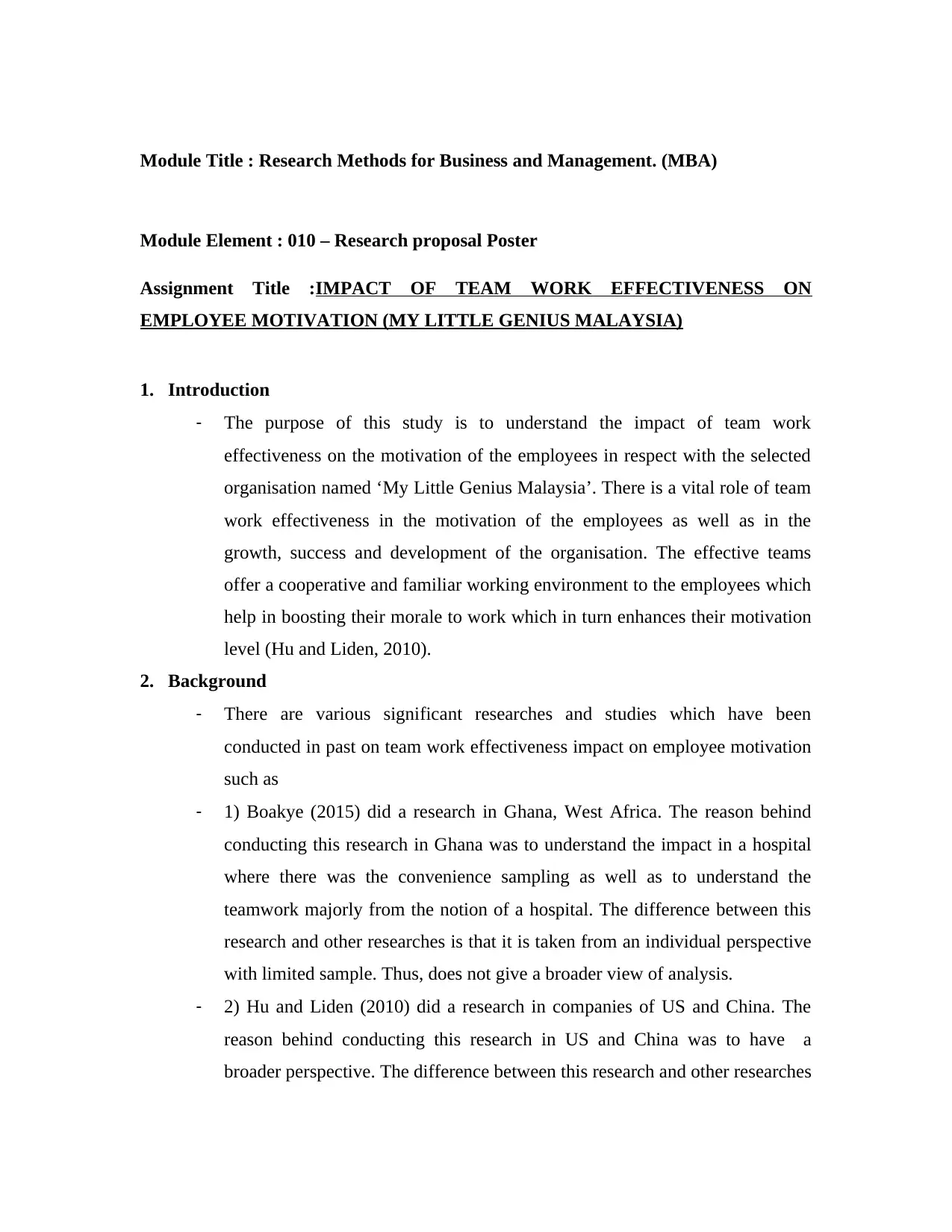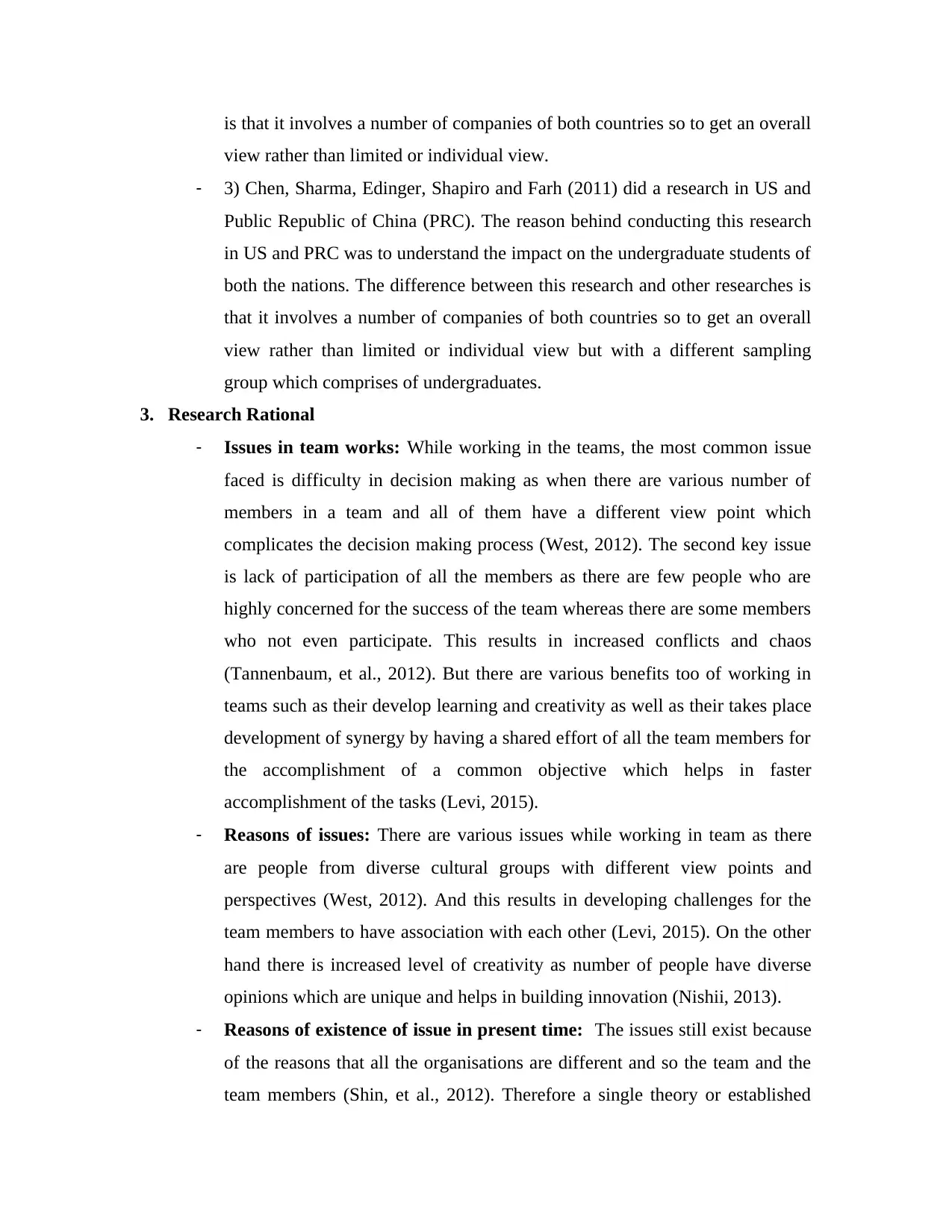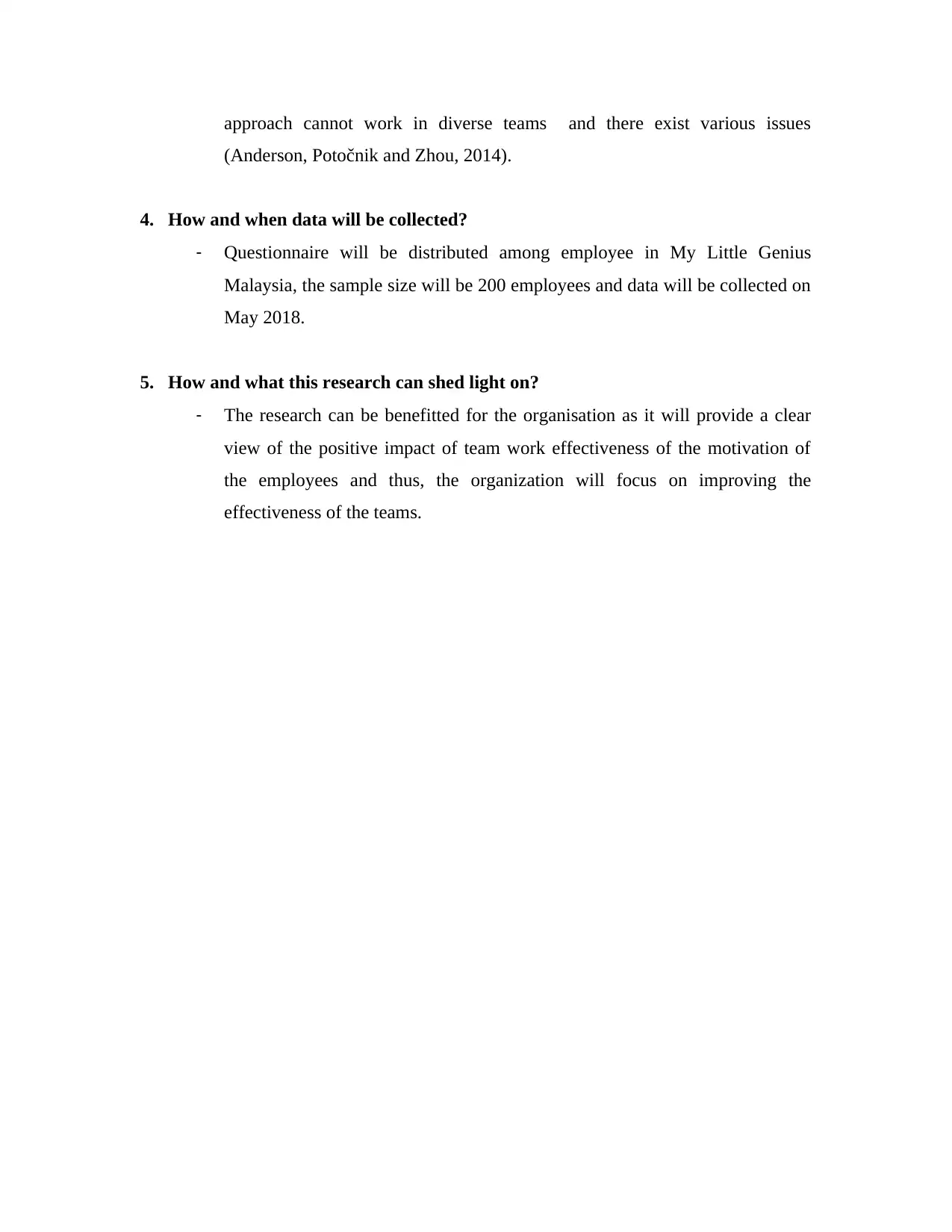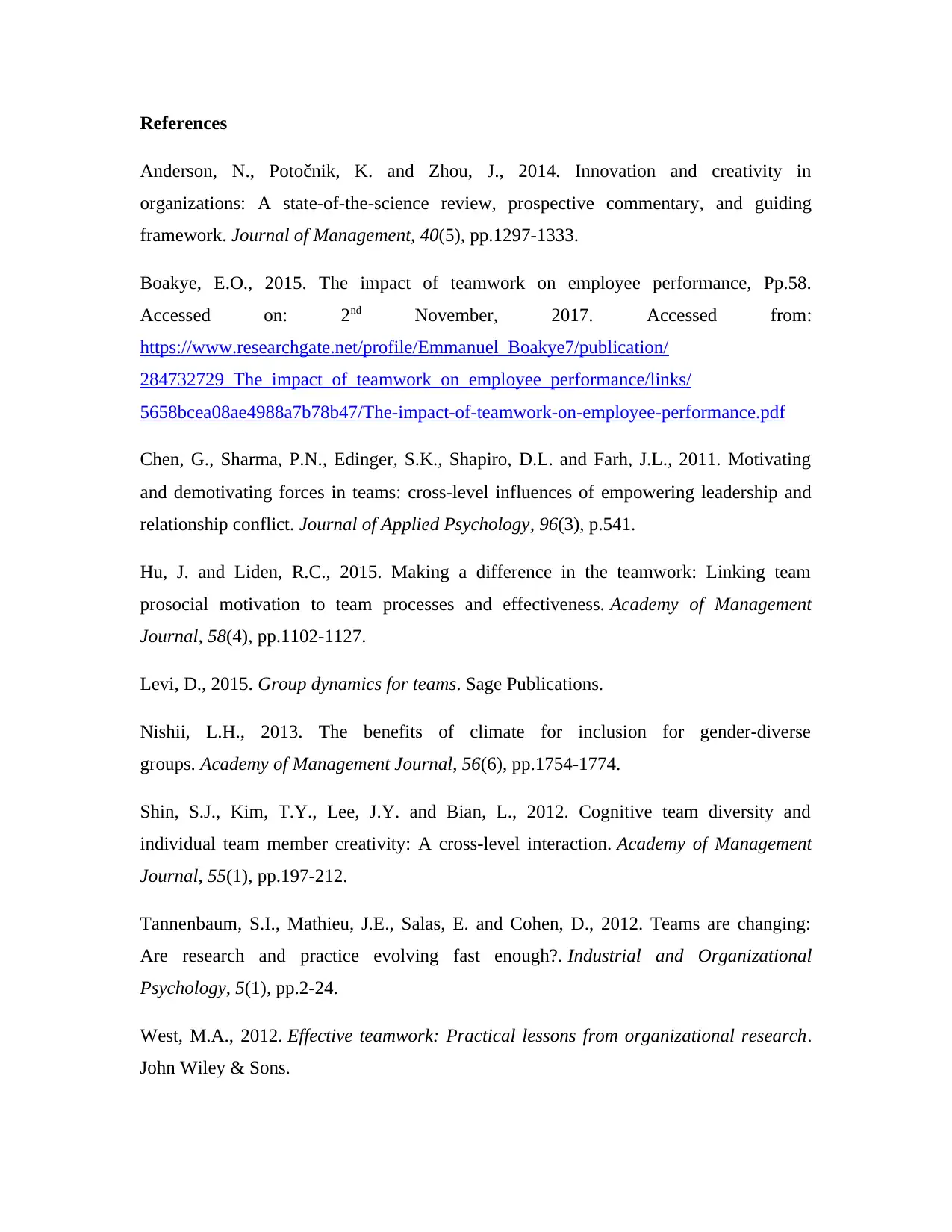Impact of Teamwork Effectiveness on Employee Motivation (MBA Research)
VerifiedAdded on 2020/04/21
|4
|1127
|97
Project
AI Summary
This research proposal examines the impact of teamwork effectiveness on employee motivation within the context of 'My Little Genius Malaysia.' The study aims to understand how effective teamwork contributes to employee morale, organizational growth, and success. It reviews existing research, identifies issues in teamwork such as decision-making difficulties and lack of participation, and explores the reasons behind these issues, including cultural diversity and varying viewpoints. The research will collect data through questionnaires distributed to 200 employees in May 2018. The findings are expected to provide insights for improving team effectiveness and enhancing employee motivation. The proposal also references relevant studies by Boakye (2015), Hu and Liden (2010), and others, to support its arguments and provide context to the research topic.

Module Title : Research Methods for Business and Management. (MBA)
Module Element : 010 – Research proposal Poster
Assignment Title :IMPACT OF TEAM WORK EFFECTIVENESS ON
EMPLOYEE MOTIVATION (MY LITTLE GENIUS MALAYSIA)
1. Introduction
- The purpose of this study is to understand the impact of team work
effectiveness on the motivation of the employees in respect with the selected
organisation named ‘My Little Genius Malaysia’. There is a vital role of team
work effectiveness in the motivation of the employees as well as in the
growth, success and development of the organisation. The effective teams
offer a cooperative and familiar working environment to the employees which
help in boosting their morale to work which in turn enhances their motivation
level (Hu and Liden, 2010).
2. Background
- There are various significant researches and studies which have been
conducted in past on team work effectiveness impact on employee motivation
such as
- 1) Boakye (2015) did a research in Ghana, West Africa. The reason behind
conducting this research in Ghana was to understand the impact in a hospital
where there was the convenience sampling as well as to understand the
teamwork majorly from the notion of a hospital. The difference between this
research and other researches is that it is taken from an individual perspective
with limited sample. Thus, does not give a broader view of analysis.
- 2) Hu and Liden (2010) did a research in companies of US and China. The
reason behind conducting this research in US and China was to have a
broader perspective. The difference between this research and other researches
Module Element : 010 – Research proposal Poster
Assignment Title :IMPACT OF TEAM WORK EFFECTIVENESS ON
EMPLOYEE MOTIVATION (MY LITTLE GENIUS MALAYSIA)
1. Introduction
- The purpose of this study is to understand the impact of team work
effectiveness on the motivation of the employees in respect with the selected
organisation named ‘My Little Genius Malaysia’. There is a vital role of team
work effectiveness in the motivation of the employees as well as in the
growth, success and development of the organisation. The effective teams
offer a cooperative and familiar working environment to the employees which
help in boosting their morale to work which in turn enhances their motivation
level (Hu and Liden, 2010).
2. Background
- There are various significant researches and studies which have been
conducted in past on team work effectiveness impact on employee motivation
such as
- 1) Boakye (2015) did a research in Ghana, West Africa. The reason behind
conducting this research in Ghana was to understand the impact in a hospital
where there was the convenience sampling as well as to understand the
teamwork majorly from the notion of a hospital. The difference between this
research and other researches is that it is taken from an individual perspective
with limited sample. Thus, does not give a broader view of analysis.
- 2) Hu and Liden (2010) did a research in companies of US and China. The
reason behind conducting this research in US and China was to have a
broader perspective. The difference between this research and other researches
Paraphrase This Document
Need a fresh take? Get an instant paraphrase of this document with our AI Paraphraser

is that it involves a number of companies of both countries so to get an overall
view rather than limited or individual view.
- 3) Chen, Sharma, Edinger, Shapiro and Farh (2011) did a research in US and
Public Republic of China (PRC). The reason behind conducting this research
in US and PRC was to understand the impact on the undergraduate students of
both the nations. The difference between this research and other researches is
that it involves a number of companies of both countries so to get an overall
view rather than limited or individual view but with a different sampling
group which comprises of undergraduates.
3. Research Rational
- Issues in team works: While working in the teams, the most common issue
faced is difficulty in decision making as when there are various number of
members in a team and all of them have a different view point which
complicates the decision making process (West, 2012). The second key issue
is lack of participation of all the members as there are few people who are
highly concerned for the success of the team whereas there are some members
who not even participate. This results in increased conflicts and chaos
(Tannenbaum, et al., 2012). But there are various benefits too of working in
teams such as their develop learning and creativity as well as their takes place
development of synergy by having a shared effort of all the team members for
the accomplishment of a common objective which helps in faster
accomplishment of the tasks (Levi, 2015).
- Reasons of issues: There are various issues while working in team as there
are people from diverse cultural groups with different view points and
perspectives (West, 2012). And this results in developing challenges for the
team members to have association with each other (Levi, 2015). On the other
hand there is increased level of creativity as number of people have diverse
opinions which are unique and helps in building innovation (Nishii, 2013).
- Reasons of existence of issue in present time: The issues still exist because
of the reasons that all the organisations are different and so the team and the
team members (Shin, et al., 2012). Therefore a single theory or established
view rather than limited or individual view.
- 3) Chen, Sharma, Edinger, Shapiro and Farh (2011) did a research in US and
Public Republic of China (PRC). The reason behind conducting this research
in US and PRC was to understand the impact on the undergraduate students of
both the nations. The difference between this research and other researches is
that it involves a number of companies of both countries so to get an overall
view rather than limited or individual view but with a different sampling
group which comprises of undergraduates.
3. Research Rational
- Issues in team works: While working in the teams, the most common issue
faced is difficulty in decision making as when there are various number of
members in a team and all of them have a different view point which
complicates the decision making process (West, 2012). The second key issue
is lack of participation of all the members as there are few people who are
highly concerned for the success of the team whereas there are some members
who not even participate. This results in increased conflicts and chaos
(Tannenbaum, et al., 2012). But there are various benefits too of working in
teams such as their develop learning and creativity as well as their takes place
development of synergy by having a shared effort of all the team members for
the accomplishment of a common objective which helps in faster
accomplishment of the tasks (Levi, 2015).
- Reasons of issues: There are various issues while working in team as there
are people from diverse cultural groups with different view points and
perspectives (West, 2012). And this results in developing challenges for the
team members to have association with each other (Levi, 2015). On the other
hand there is increased level of creativity as number of people have diverse
opinions which are unique and helps in building innovation (Nishii, 2013).
- Reasons of existence of issue in present time: The issues still exist because
of the reasons that all the organisations are different and so the team and the
team members (Shin, et al., 2012). Therefore a single theory or established

approach cannot work in diverse teams and there exist various issues
(Anderson, Potočnik and Zhou, 2014).
4. How and when data will be collected?
- Questionnaire will be distributed among employee in My Little Genius
Malaysia, the sample size will be 200 employees and data will be collected on
May 2018.
5. How and what this research can shed light on?
- The research can be benefitted for the organisation as it will provide a clear
view of the positive impact of team work effectiveness of the motivation of
the employees and thus, the organization will focus on improving the
effectiveness of the teams.
(Anderson, Potočnik and Zhou, 2014).
4. How and when data will be collected?
- Questionnaire will be distributed among employee in My Little Genius
Malaysia, the sample size will be 200 employees and data will be collected on
May 2018.
5. How and what this research can shed light on?
- The research can be benefitted for the organisation as it will provide a clear
view of the positive impact of team work effectiveness of the motivation of
the employees and thus, the organization will focus on improving the
effectiveness of the teams.
⊘ This is a preview!⊘
Do you want full access?
Subscribe today to unlock all pages.

Trusted by 1+ million students worldwide

References
Anderson, N., Potočnik, K. and Zhou, J., 2014. Innovation and creativity in
organizations: A state-of-the-science review, prospective commentary, and guiding
framework. Journal of Management, 40(5), pp.1297-1333.
Boakye, E.O., 2015. The impact of teamwork on employee performance, Pp.58.
Accessed on: 2nd November, 2017. Accessed from:
https://www.researchgate.net/profile/Emmanuel_Boakye7/publication/
284732729_The_impact_of_teamwork_on_employee_performance/links/
5658bcea08ae4988a7b78b47/The-impact-of-teamwork-on-employee-performance.pdf
Chen, G., Sharma, P.N., Edinger, S.K., Shapiro, D.L. and Farh, J.L., 2011. Motivating
and demotivating forces in teams: cross-level influences of empowering leadership and
relationship conflict. Journal of Applied Psychology, 96(3), p.541.
Hu, J. and Liden, R.C., 2015. Making a difference in the teamwork: Linking team
prosocial motivation to team processes and effectiveness. Academy of Management
Journal, 58(4), pp.1102-1127.
Levi, D., 2015. Group dynamics for teams. Sage Publications.
Nishii, L.H., 2013. The benefits of climate for inclusion for gender-diverse
groups. Academy of Management Journal, 56(6), pp.1754-1774.
Shin, S.J., Kim, T.Y., Lee, J.Y. and Bian, L., 2012. Cognitive team diversity and
individual team member creativity: A cross-level interaction. Academy of Management
Journal, 55(1), pp.197-212.
Tannenbaum, S.I., Mathieu, J.E., Salas, E. and Cohen, D., 2012. Teams are changing:
Are research and practice evolving fast enough?. Industrial and Organizational
Psychology, 5(1), pp.2-24.
West, M.A., 2012. Effective teamwork: Practical lessons from organizational research.
John Wiley & Sons.
Anderson, N., Potočnik, K. and Zhou, J., 2014. Innovation and creativity in
organizations: A state-of-the-science review, prospective commentary, and guiding
framework. Journal of Management, 40(5), pp.1297-1333.
Boakye, E.O., 2015. The impact of teamwork on employee performance, Pp.58.
Accessed on: 2nd November, 2017. Accessed from:
https://www.researchgate.net/profile/Emmanuel_Boakye7/publication/
284732729_The_impact_of_teamwork_on_employee_performance/links/
5658bcea08ae4988a7b78b47/The-impact-of-teamwork-on-employee-performance.pdf
Chen, G., Sharma, P.N., Edinger, S.K., Shapiro, D.L. and Farh, J.L., 2011. Motivating
and demotivating forces in teams: cross-level influences of empowering leadership and
relationship conflict. Journal of Applied Psychology, 96(3), p.541.
Hu, J. and Liden, R.C., 2015. Making a difference in the teamwork: Linking team
prosocial motivation to team processes and effectiveness. Academy of Management
Journal, 58(4), pp.1102-1127.
Levi, D., 2015. Group dynamics for teams. Sage Publications.
Nishii, L.H., 2013. The benefits of climate for inclusion for gender-diverse
groups. Academy of Management Journal, 56(6), pp.1754-1774.
Shin, S.J., Kim, T.Y., Lee, J.Y. and Bian, L., 2012. Cognitive team diversity and
individual team member creativity: A cross-level interaction. Academy of Management
Journal, 55(1), pp.197-212.
Tannenbaum, S.I., Mathieu, J.E., Salas, E. and Cohen, D., 2012. Teams are changing:
Are research and practice evolving fast enough?. Industrial and Organizational
Psychology, 5(1), pp.2-24.
West, M.A., 2012. Effective teamwork: Practical lessons from organizational research.
John Wiley & Sons.
1 out of 4
Your All-in-One AI-Powered Toolkit for Academic Success.
+13062052269
info@desklib.com
Available 24*7 on WhatsApp / Email
![[object Object]](/_next/static/media/star-bottom.7253800d.svg)
Unlock your academic potential
Copyright © 2020–2026 A2Z Services. All Rights Reserved. Developed and managed by ZUCOL.